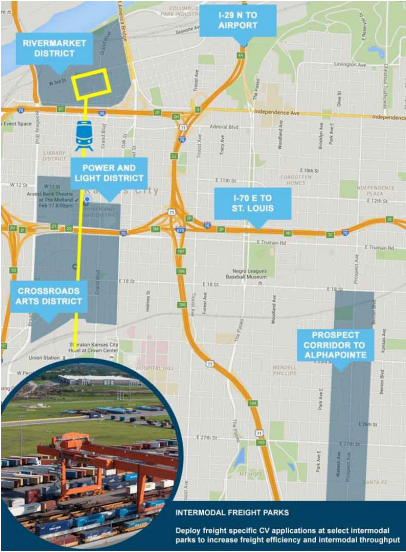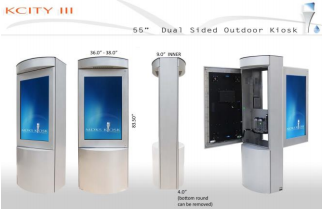Connecting state and local government leaders
The city wants to expand its digital corridors to better connect neighborhoods, deploy autonomous buses and boost mobility for residents and visitors.
This is the second in a series of profiles on the seven U.S. Department of Transportation Smart City Challenge finalist cities, which will have representatives in Washington, D.C., on Thursday, June 9 to present their final grant applications to U.S. Transportation Secretary Anthony Foxx and competition judges. Read our other Smart City Challenge finalists profiles on Austin, Denver, Columbus, Portland and San Francisco. | REGISTER for the June 9 Smart City Challenge livestream.
Imagine you arrive at the airport in Kansas City, Missouri, for a convention, and an information kiosk at baggage claim tells you how to get downtown. On that kiosk you arrange transportation, an express bus you ride to the new streetcar line that has Wi-Fi—free, public wireless you can access the moment you enter the city.
The streetcar takes you five stops so you can drop your luggage off at the downtown Marriott or Aladdin Holiday Inn hotels, before you walk north to the streetcar’s terminus. There you get on bus rapid transit to the Negro Leagues Baseball Museum, which you’re touring until you receive a text message letting you know that last-minute meeting you requested can happen in an hour.
Using your smartphone, you open Kansas City’s mobility app and book a zTrip sedan to an autonomous bus that gets you to your engagement on time.

Some of this is already possible, and all of it could be, if Kansas City wins the U.S. Department of Transportation’s Smart City Challenge and the $40 million in “funding subject to future appropriations” that comes along with the honor, along with $10 million more from Seattle-based Vulcan.
“Federal funding has always been seed corn in a lot of ways,” Bob Bennett, the city’s chief innovation officer, told Route Fifty in an interview. “In terms of this particular grant, the infrastructure we intend to put in is valued at significantly more than the grant value that DOT is providing.”
But as with the $20 million in TIGER discretionary grants the USDOT provided Kansas City to implement the first smart transportation corridor in the country, KC Streetcar, that funding serves as a downpayment spurring development by lowering the cost of business and creating a partner enterprise.
The city was able to raise the additional $80.7 million needed for the project, coming in on time and under budget. And Kansas City exceeded its goal of $500 million in business development within the corridor over 30 years between 2013 and May—at $1.7 billion already.
“Cities are no longer independent, large acting entities,” Bennett said. “We’re part of an ecosystem with nonprofits to help us reach out across the digital divide and solve opportunity issues.”
Central to those efforts is the largest Wi-Fi umbrella in the world, integrated into the streetcar, and with 10 percent of its bandwidth dedicated to Internet of Things sensors in streetlights. Sensors count people, traffic and manage flow, rather than stoplights being mechanically timed as they are in most cities.
Wi-Fi extends to 21 4.6-feet-tall information kiosks already along the corridor, with five more on the way.

Using transportation—in this case KC Streetcar—as a two-mile “spine” running primarily down Main Street, Kansas City connected its River Market and Crown Center districts under the umbrella.
Now the city wants to embed the same technologies, but with bus rapid transit serving as the spine, to connect its East Side and West Side.
Kansas City’s eastern third hosts most of its economically distressed ZIP codes, with north-south Troost Avenue seen as the racial divide.
A handful of bus routes serve neighborhoods on the East Side on any given day. And the city wants to add Wi-Fi kiosks and intense, economical LED lighting, outfitted with ShotSpotter gunshot detection sensors, along two or three—crime being a concern in the area.
The buses themselves would be autonomous. Bennett predicts the technology will be a reality within three years, and carry eastern residents to western jobs.
Neighborhoods on the West Side still lack development on north-south Summit Street, where one of the autonomous bus lines running along 18th Street would end. Beautiful views of the intersecting Missouri and Kansas rivers can be had where an arts district is also developing.
Another line would link 12th Street to Main Street to West Bottoms, where many of the cattle drives once ended at the city’s stockyards. Most of the U.S. once got its meat from West Bottoms’ warehouses, where cattle “came in on hoof and left by train,” Bennett said, but now they’re mostly home to antique fairs.
Dedicated short range communications are needed for the autonomous buses to run, and volunteers will be enlisted to install onboard units for vehicle-to-vehicle comms.
While Kansas City, Missouri, encompasses an expansive area within its jurisdictional limits—the city has 319 square miles spread across three counties—its current population of roughly 467,000 residents means that the city has low density. Most people have cars and commuting distances are measured in miles in a city that also boasts the largest expanse of highways of anywhere in the nation.
“That was cool in the ’60s and ’70s, but now it’s a huge maintenance bill,” Bennett said. “So we’re trying to get citizens to use public transportation more.”
Streetcar Wi-Fi is a value add because commuters can start their workday on their mobile devices as they travel, and Kansas City also has designs to launch an overarching transportation application—much the same way Los Angeles and Denver have.
The mobility app would advise arrivals to take the express bus from the airport, 18 miles north of the city, to its streetcar line and plan the fastest routes pulling from transportation options like ridesharing app zTrip, crowdsourced bus Bridj, bike share Kansas City B-cycle, and other public and private services. Also for the app: Bennett would like to see a walking option, Kansas City will have added 10 bikeshare stations for a total of 37 by the end of the grant period, and Zipcar deployment is being accelerated.
Coupling the app with widespread smart sensors, the city will collect vast amounts of data to synchronize transportation needs like the proper amount of electricity to power the streetcar and Prospect Avenue MAX bus rapid transit lines.
“Once you start manipulating data to effectively make decisions—that’s when you’re a smart city,” Bennett said.
Where to focus police patrols and waste collection will be better planned, and on-the-spot corrections more easily made when streetlights count 500 more people than anticipated in town for an event.
Bennett submitted Kansas City’s finalized challenge application on May 24, and Mayor Sly James will deliver an oral presentation on the vision to USDOT judges in Washington D.C. on June 9.
“Kansas City can go the farthest of all the cities in terms of providing technology and data that make the city truly smart at the conclusion of the grant period,” Bennett said. “We’ve got the track record of business relationships, community buy-in, and we can start construction within 90 days.”
Dave Nyczepir is a News Editor at Government Executive’s Route Fifty.

NEXT STORY: DARPA wants to teach machines how to learn




